Ross Gay's Book of (More) Delights
Air Date: Week of March 8, 2024
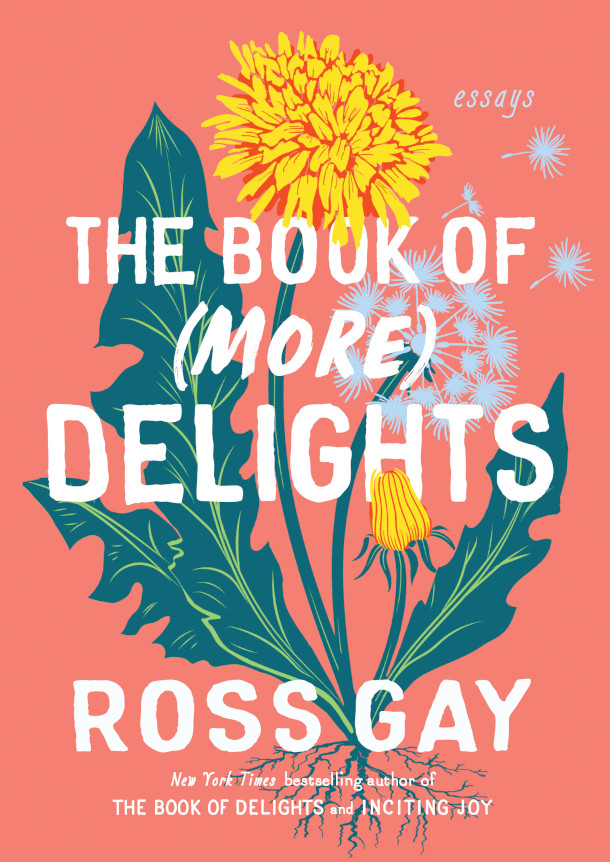
Ross Gay’s The Book of (More) Delights highlights the joy one can find in everyday life and in the natural world. (Photo: Courtesy of Ross Gay and Algonquin Books)
Poet and essayist Ross Gay is back with a follow up to his 2019 Book of Delights, loaded with moments of good that sprout amid our troubles. He joins Host Steve Curwood to share readings from his new Book of (More) Delights celebrating simple joys such as clothes on a clothesline, garlic sprouting, and dandelion abundance.
Transcript
BELTRAN: It’s Living on Earth, I’m Paloma Beltran.
CURWOOD: And I’m Steve Curwood.
Living on this earth can be a challenge these days. Plenty of crises from the climate to geopolitics can make you feel blue. But poet and essayist Ross Gay keeps creating antidotes to brighten you up. A few years ago he compiled The Book of Delights, loaded with moments of good that sprout amid our troubles. And now after the pandemic he’s back with The Book of (More) Delights with even more scrumptious moments to savor on our complicated planet. Hi Ross and welcome back to Living on Earth!
GAY: Thank you. It's good to see you.
CURWOOD: So this is your second Book of Delights. But what is a delight, exactly?
GAY: You know, I lately have been thinking of it as just like the sort of pleasant, fleeting, often evidence of life. That's really what I've been thinking of it as, this kind of something sweet that happens that often is surprising, that often we don't necessarily know it's delightful, but it happens and we recognize it. And that that, to me, sort of constitutes, "Oh, delight."
CURWOOD: Now, your first Book of Delights came out in 2019. Since then, a few things have happened, like the pandemic. So how did your approach change when writing this book?
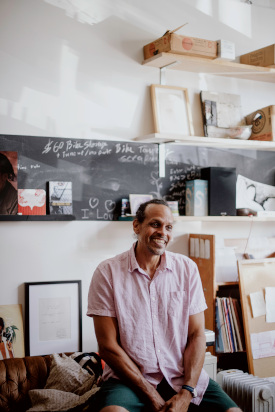
Ross Gay’s work focuses on delight not only as one of the pleasures of human life, but as a source of resistance against oppression. (Photo: Natasha Komoda)
GAY: I feel like the books are, they're contemporary. They're sort of like considering what's happening day to day, they have a kind of diaristic quality to them. So I'm talking about what's happening. I think, really, the thing that changed most is that it was five years later. I had aged.
CURWOOD: Oh, my goodness, that does happen, doesn't it?
GAY: So you know, like, in the process of writing it, elders died, you know, like, my relationship with my mother is changing as we both are getting older. All kinds of things like that. The book is really a book about aging. I feel like that's one of the things that it is.
CURWOOD: Yeah, this is not television, of course, but you do have a few more gray hairs in that beard, Ross.
GAY: [LAUGHS.] It's true.
CURWOOD: Now, one of your delights is about the joy of clothes on a clothesline. My mother and grandmother loved bringing the clothes in from the line, and this one really hits home for me. I mean, she’d tell me to bury my face in the sheets—“Smell that,” she'd say. Would you mind reading that delight for us? It's on page 19.
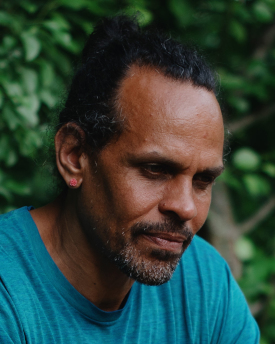
The Book of (More) Delights reminds us that we are life. (Photo: Natasha Komoda)
GAY: Yes. "The Clothesline." There are so many simple pleasures, simple delights, and maybe the goal, the practice, is to be delighted especially by them, the simplest of things. For instance, today, among the many, I offer the clothesline, not only for its utility, how it keeps the house from getting hot in the summer, how it saves a little energy and burns a little less CO2, but also for how it reminds you that your grandma in northern Minnesota loved to hang her sheets on a clothesline in the winter for how they smelled after they froze, and that your mother loves the smell of anything hung out. But also this, I’m thinking today, as I admire my T-shirts and shorts and drawers and towels blowing in the wind like Tibetan flags, like a ramshackle and sometimes threadbare rainbow: that a clothesline reminds you how often we make of our simple daily labors (hanging clothes, folding clothes, washing dishes, arranging the fridge or the cupboards, chopping veggies or wrapping the bread, sweeping up, or mopping) an art.
CURWOOD: Indeed. Now a lot of your essays talk about finding delight in the natural world. How intentional was that? Or does it just simply kind of emerge on its own?
GAY: I think it emerged on its own. I'm a serious gardener. I love the garden. And you know, I spend a lot of time kind of paying close attention to trying to pay close attention to what's happening out there. So I think it probably just emerges by being part of what I do regularly.
CURWOOD: There's a great example of a delight about the natural world and you getting your fingers dirty in the ground. It's called "Garlic Sprouting." It's on page 145. Could you read that, please?
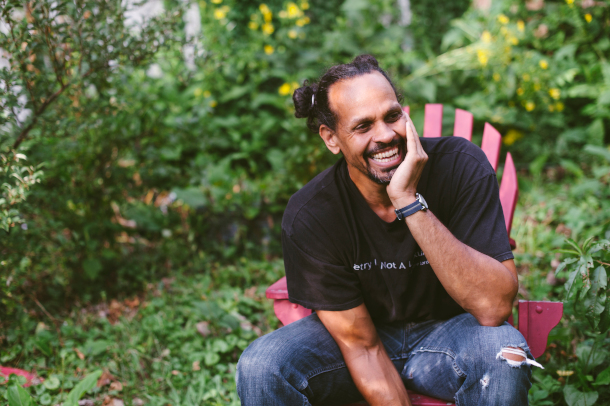
Author Ross Gay enjoys spending time in his garden, watching garlic sprout. (Photo: Natasha Komoda)
GAY: "Garlic Sprouting." Although I infrequently feel it when I’m planting garlic in the fall, always later than I’m supposed to (ballpark Halloween, in my book), and although this is my thirteenth consecutive year of planting garlic, during which I’ve had twelve either reasonably or exceptionally successful crops, I realized today that I plant garlic, every year, with no small degree of doubt that it will actually come up, or make, as we say in the trade. I mean, when it comes to garlic, I am batting 1.000. I should say, garlic is batting 1.000. I just hand garlic the bat. But you get my point. Though I didn’t realize, or better yet, I didn’t register, that I plant garlic doubtfully until today, as I was sitting on the back porch, because spring is springing and we’re having a warm one, and midway through a phone call I cast my gaze unexpectantly over the garlic beds and, wouldn’t you know, they were all sprouting, unsheathing a few hundred green blades up toward the sun. With the enthusiasm of someone witnessing a miracle, Lazarus waltzing from his cave or something, I interrupted the friend I was talking to, Wait, wait, yo, it’s up, it’s sprouting! The garlic’s sprouting! It’s up! (The friend seemed glad for me.) Who knew that in addition to vampires and getting your tomato sauce right, garlic’s your tiny professor of faith, your pungent don of gratitude?
CURWOOD: Indeed. I never knew that until now.
GAY: [LAUGHS.] I know, it took me a long time to realize that too. And again and again and again it feels like the garden shows me that like, oh, and this is another thing to be grateful for.
CURWOOD: One of my other favorite delights that you have is the "Squirrel in a Pumpkin." It's on page 80 And I will try to not laugh while you're reading because I don't want to mess up the recording. But could you please read it for us?
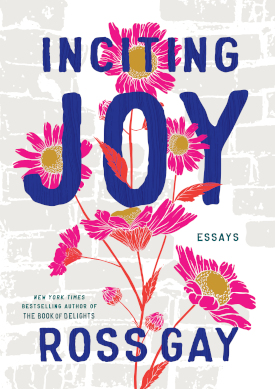
Ross Gay’s work includes books such as Inciting Joy: Essays, Be Holding, and Catalog of Unbashed Gratitude. (Photo: Courtesy of Ross Gay and Algonquin Books)
GAY: Sure. "Squirrel in a Pumpkin." On a porch, down the block, on my way, distracted from which, reminded of which, and I was very still, so the critter gobbled away though with an eye on me, which you could tell was really on me when looking down into the pumpkin for more goodies, looking at me, then looking down, then looking at me, then looking down, then looking at me one more time to be sure I guess I was not actually one of the neighborhood cats dressed up like a human being with a backpack, before plunging headlong into the gourd so that all that remained visible of the critter was that plump butt, those long-footed rear legs, and that tail, buoyant, flamboyant, and well, gaudy, even gauche, truth be told. Until popping back out of the pumpkin, eyeballing me again while working over this seed, which, to the squirrel, from the looks of it, would be like me eating a little pizza. I’m talking scale here. This squirrel was in the plumping phase of the year, not worried about spring break. And because of my job, a lucky job as far as they go, I thought, Oh, this is a delight, let me write this down. So I elegantly swiveled my backpack into my frontpack, unzipped slowly as possible, reached into the bag, and as I was pulling out my notebook, the squirrel looked at me like Oh no you don’t you cat dressed as a human, and tipped away, as they do, which might be a small but useful lesson on the differences, or perhaps the consequences, of acquiring, versus being with, or in, or of, the delight.
CURWOOD: So I love this image of make sure that one of those neighborhood cats dressed up like a human.
GAY: It's a sweet one.
CURWOOD: And then gently admonishing us to stay in the moment.
GAY: Yeah.
CURWOOD: You know, like so many of us pull out our iPhones to take a picture of something that’s going on.
GAY: I know it. I know it. That's one of the things that I sort of recognize, and people ask, also, is if the writing down of the delight is a kind of interruption of that process of being in the delight. I think it's a great question. And I also think there's some real deep impulse in us to note and share what we love. And I think that's also like a thing to really value.
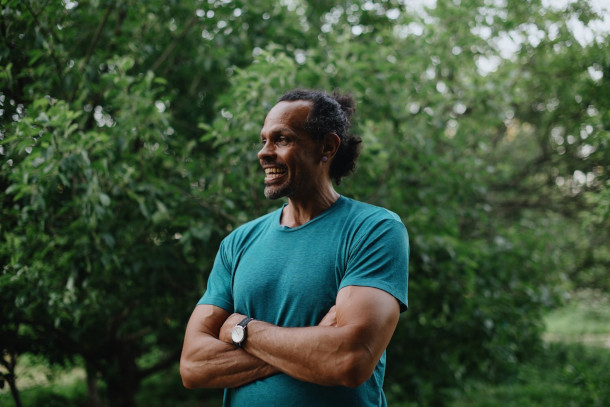
Ross Gay finds delight in the simplest of tasks, like doing laundry. (Photo: Natasha Komoda)
CURWOOD: Now, you wrote a delight almost every day for an entire year, but you limit the book to 81 delights. So what makes a delight really compelling in your view?
GAY: There's probably a bunch of things. But one of the things, for sure, is if the delight comes from a question as opposed to an understanding. So if the delight sort of holds the fact that I'm wondering about what makes it delightful, as opposed to this other thing, which is like sometimes I'm delighted by something that I kind of know why, and I'm going to explain it. In a way, it almost feels like that's the simplest sort of measure of whether or not I'm going to find it interesting enough to keep. The reason that I write, as I sometimes think these days, is to unknow myself. I want to write with a kind of wonder that makes what I thought I had thought a little bit shaky. Thinking about what you love is one of the ways to do that, to think as powerfully, as closely, as sort of intensely about something. Ideally, for me, I'll come to know that whatever it is that I'm thinking about differently.
CURWOOD: By the way, you have in your book, a recipe for dandelion fritters. The delight is called “Truly Overnight Sometimes It Seems.” I'm wondering if you could please read that essay for us. It's on page 177.
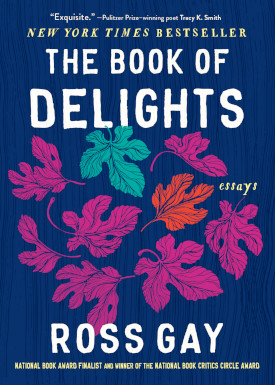
Writing The Book of (More) Delights following 2019's The Book of Delights inspired Ross Gay to think more about the aging process. (Photo: Ross Gay and Algonquin Books)
GAY: "Truly Overnight Sometimes It Seems." It is truly overnight sometimes it seems that the dandelions put on their crowns, and just like that, the world is suddenly brighter, more abundant, more possible—this, of course, if you, like me, adore the dandelion, see their unmartial ranks suddenly outflanking the gloom, outflowering the doom, and if you, like me, make love (a little much?) with its absolutely usable body, body of utter benevolence, body of total beneficence, petite and profligate and gleeful lovenote: the roots for all kinds of medicine, not to mention your various probiotic, bitter, hot morning drinks (for the caffeine-weaning among us); the flowers, which are actually (get close—no, closer—you’ll see what I mean) a million flowers, which the pollinators bloom into a winged dancefloor at our feet; and the leaves, little lion’s teeth, which, in addition to throwing them into your tomato sauce or greens or smoothie or black-eyed-pea fritters, you might do like this: handful or two of leaves, chopped, flour of your choice (cornmeal, chickpea, lentil, whole wheat), onion, garlic powder, paprika, salt, baking powder, water enough to get it all to a clumpy, dandy consistency. Fry in oil on low heat. Or bake them. You can use the flowers for this, too, which can probably be a way of managing or curtailing their reproduction—they [BEEP] like bunnies: those million flowers turn into a million seeds turn into a million million dandelions turn to a million million seeds, all of which is to say, the dandelion giggles at the capitalistic (and monotheistic [No other god but me & etc.] and pop song monogomistic [no one will ever love you like I do & etc.]) myth of scarcity for which it must be destroyed, and quick!—which I have no interest in doing, for they are my most consistent, prolific, generous, trouble- and labor-free crop. I mean, when the squash bugs get the squash, and the cabbage moths the collards, and the blight the tomatoes, the dandelions are steady Freddy. They are the Draymond Greens and Marcus Smarts of the garden. The Brian Grants. The Mo Cheekses or Bobby Joneses. The Patrick Beverleys. They always show up and give their all. We need to give them their flowers! They are also little beacons of the it’ll be okay, and if they had a soundtrack, it would be “O-o-h Child.” Maybe their prettiness, by which I really mean beauty, is because their roots go so far down, they fathom the depths (which, pretty sure, also explains their nutritive profile: Kale can’t hold dandelion’s jockstrap), and those beautiful flowers are missives from the deep. Or the dark. Or the mystery. Or the unknown. Or the underworld. Whichever word we want to use today to mean the dead, or at least the dead-adjacent. Missives from the dead, these little festive blooms. To which, I don’t know about you, but I’m trying to listen.
CURWOOD: Ross, these are difficult times for some of us, maybe all of us. I mean, you think of the climate crisis, various political situations, the world does not feel to be in such a great place. And sometimes when people get depressed they, they're not necessarily interested in finding delights. How can they make the connection, get the antidote to this despair and, and sadness?
GAY: The thing that I think I could say is that it often feels like we live inside of a kind of culture of death, say economy of death, certainly. By which I mean, there's money to be made off of war. There's money to be made off of illness. There's money to be made off of precarity. You know, we're in the midst of a genocide in Gaza. The United States is funding and supporting that genocide. It feels to me that among the things that delight does, is to remind us, as I said at the beginning, that it reminds us that we are life. It reminds us that we are among the living. And it feels to me that the reason we refuse brutality is because we savor and honor and love the sweetness. We refuse the brutality because we are being reverent to life. And it feels like delight is like a little way that we're reminded like, oh, remember life, like remember this sweetness of our connection to one another. Remember this way that we are in fact beholden to one another, and the one another as sort of grand and you know, like these, you know, when the garlic comes up. That's the evidence of being beholden to this thing called life. It seems to me that we have to remember we are in fact beholden to and we need to spend time revering.
CURWOOD: Ross Gay is a poet and author of The Book of (More) Delights. Ross, thanks so much for taking time with us today.
GAY: Thank you. It's great to talk with you.
Links
Living on Earth wants to hear from you!
Living on Earth
62 Calef Highway, Suite 212
Lee, NH 03861
Telephone: 617-287-4121
E-mail: comments@loe.org
Newsletter [Click here]
Donate to Living on Earth!
Living on Earth is an independent media program and relies entirely on contributions from listeners and institutions supporting public service. Please donate now to preserve an independent environmental voice.
NewsletterLiving on Earth offers a weekly delivery of the show's rundown to your mailbox. Sign up for our newsletter today!
 Sailors For The Sea: Be the change you want to sea.
Sailors For The Sea: Be the change you want to sea.
 The Grantham Foundation for the Protection of the Environment: Committed to protecting and improving the health of the global environment.
The Grantham Foundation for the Protection of the Environment: Committed to protecting and improving the health of the global environment.
 Contribute to Living on Earth and receive, as our gift to you, an archival print of one of Mark Seth Lender's extraordinary wildlife photographs. Follow the link to see Mark's current collection of photographs.
Contribute to Living on Earth and receive, as our gift to you, an archival print of one of Mark Seth Lender's extraordinary wildlife photographs. Follow the link to see Mark's current collection of photographs.
 Buy a signed copy of Mark Seth Lender's book Smeagull the Seagull & support Living on Earth
Buy a signed copy of Mark Seth Lender's book Smeagull the Seagull & support Living on Earth

